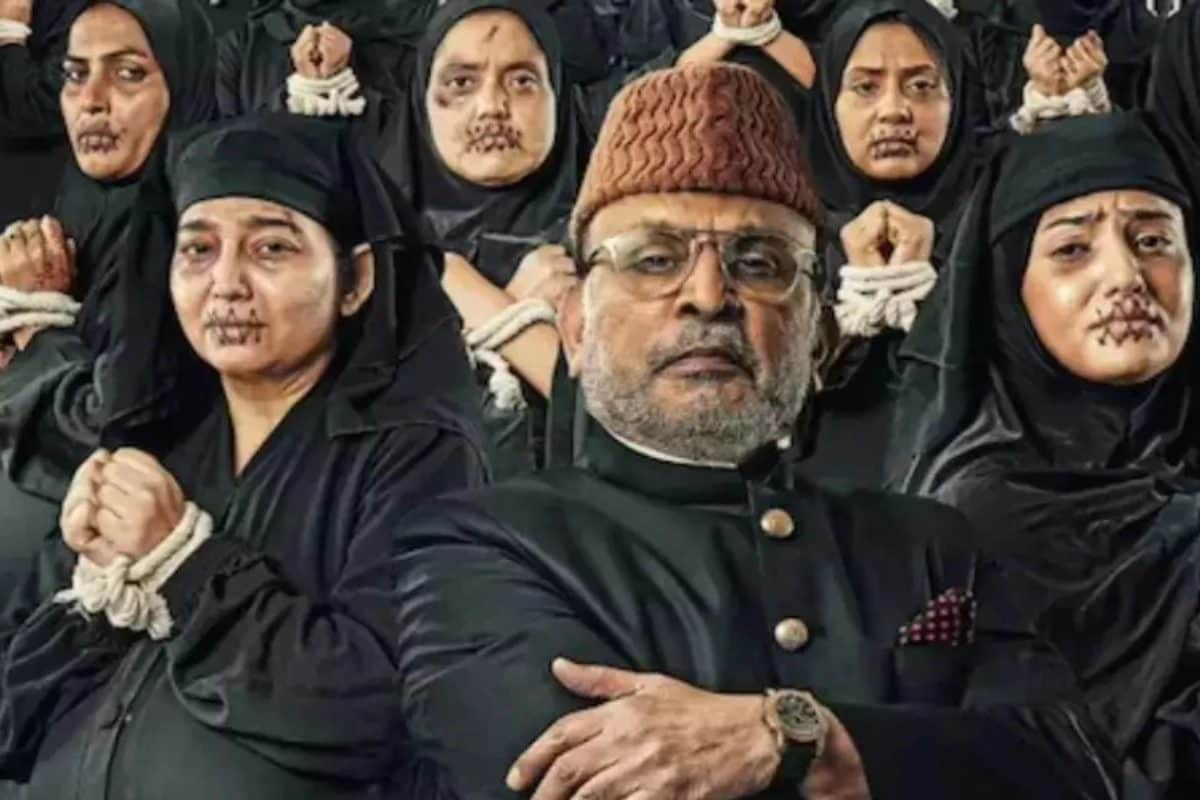Hamare Baarah Movie Review: Back in 2011, a Pakistani film titled Bol created quite a buzz for its bold subject. It marked the film debuts of Atif Aslam and Mahira Khan and dealt with themes such as consent, toxic patriarchy and misogyny with its bottom line being – why is giving birth without any family planning not a sin? Annu Kapoor starrer Hamare Baarah which released today will constantly make you think about Bol. The Hindi film questions the orthodox and radical beliefs and ideologies of Islam and how oppression of all kinds is sometimes falsely glorified in the name of treading the path of divinity and virtue.
Hamare Baarah is set in Lucknow’s Aminabad and opens with a sequence that sees a woman named Alfia moving the Lucknow High Court to file a case so to as to give her stepmother the right to abort. Her case gets easily dismissed by many with a lawyer telling her, ‘Bhaang kha ke aayi ho kya?’ It is then that she meets a woman lawyer who’s introduced as someone who ‘paise ke liye nahi, haq ke liye ladti hai’ and is known for fighting many polygamy cases.
Back home, Alfia has ten other siblings. Her father, Mansoor Ali Khan Sanjeri is an orthodox and staunch Muslim, who only believes in the madrasa style of education. According to him, western schooling drives youngsters towards drugs, alcohol and debauchery. He expects his children – both sons and daughters – to not digress from the teachings of Allah and if that requires him to pin down their wings, so be it.
His first wife Salma had passed away after giving multiple births and his second wife Rukhsar is about to meet a similar fate. She gets pregnant with Mansoor’s twelfth child, a news that brings him immense joy and pride but which can prove fatal to Rukhsar’s life as frequent pregnancies have weakened her uterus. However, the topic of abortion riles him up as he believes it’s a form of rejecting Allah’s gift and blessing. And this drives Alfia to fight for her stepmother, which obviously doesn’t sit well with Mansoor.
Hamare Baarah makes for a tough watch. It’s packed with several uncomfortable moments. Case in point: Mansoor thrashing his daughter Zareen when he comes to know that she has been selected in the top 30 of a musical reality show and has to travel to Mumbai to fulfill her dreams. Another distressful sequence is the one where Rukhsar falls to Mansoor’s feet at a hospital and begs him to not divorce her through the utterance of triple talaq. It’s the conditioning and fear of patriarchy that doesn’t let the women in the household raise their voices against his wrongdoings with Alfia being the only exception.
Hamare Baarah grapples with a controversial, critical and pertinent issue. It strives to question and critique social and religious conditioning but its shoddy treatment and execution comes in the way. Here, the makers believe that theatrics and histrionics are the only way to portray and convey a grave story that needs telling. At 2 hours 28 minutes, the film seems like a long meandering train ride that keeps stopping at every station with no certainty on when it will reach its final destination. Song sequences pop up every now and then. In fact, the first half of the film boasts of four such sequences. As for the second half, the courtroom scenes appear too long-drawn and repetitive.
Credit, however, goes to writer Rajan Agarwal who tactfully manages to pen a script that doesn’t attack Islam and Quranic teachings but cast the spotlight on how the community is misrepresented and misinterpreted by those who practice it as well as outsiders. While the story emphasises on women empowerment, it doesn’t throw men under the negative light in the process. So, on one hand, there’s Mansoor and Shahnawaz, his eldest son, who are misogynists and tyrants blinded by religious fanaticism. On the other hand, the film has Shoaib, Mansoor’s second son, and Danish, a journalist, who are feminists and are unafraid to voice their exasperation against toxic traditionalism.
Annu Kapoor ably carries Hamare Baarah on his shoulders. You’ll end up hating his Mansoor and wishing for his redemption. However, he takes the dramatic quotient many notches high in most of the scenes and it is this loudness that diminishes what the film truly set out to achieve. Paritosh Tripathi and Rahul Bagga are impressive. Aditi Bhatpahri as Alfia is a revelation. She holds her own among the ensemble cast. She proves her mettle in the emotionally heavier scenes and you’ll root for her against all odds.
Parth Samthaan as Danish brings about some much-needed calm to this high-octane narrative and he emerges as the wind beneath Alfia’s wings. Ashwini Kalsekar and Manoj Joshi as lawyers are also top-notch. The rest of the cast members, especially Ankita Dwivedi, deserve applause for their impact performances. Ankita’s vulnerability and helplessness will surely tug at your heartstrings. But all said and done, Hamare Baarah even with its heart and intent in the right place doesn’t leave an impact as strong as the nuanced and sensitively told story of Bol.
